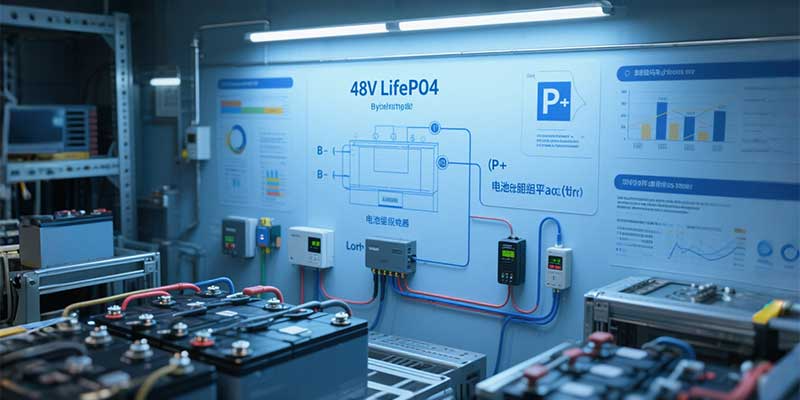As cities around the world strive to become smarter, greener, and more sustainable, the demand for reliable, clean energy solutions continues to rise. Urban planners and local governments are increasingly turning to renewable technologies to meet environmental targets while enhancing public services. At the heart of this transformation is energy storage — and Shenzhen Himax Electronics Co., Ltd. is leading the charge with its 12.8V 20Ah Lithium Iron Phosphate (LiFePO4) battery.
This advanced battery solution is specifically engineered for solar-powered bus shelters — structures that do more than simply offer a place to wait. With the integration of Himax’s robust and high-performance LiFePO4 battery, these shelters are now capable of delivering dependable LED lighting and free USB charging for commuters, even during overcast weather or nighttime hours. By enabling consistent and efficient power from renewable sources, Himax is helping cities modernize their infrastructure in an eco-conscious and cost-effective way.
The Growing Demand for Solar-Powered Transit Shelters
In recent years, solar-powered bus shelters have emerged as a vital component of modern urban landscapes. As municipalities aim to lower carbon emissions and promote energy efficiency, these structures provide an elegant solution: they offer shelter from the elements, improve street-level aesthetics, and harness the sun’s energy to power lighting and charging stations.
However, one of the biggest challenges in implementing solar bus shelters is ensuring reliable power storage and distribution — especially during periods of low sunlight or high usage. Without an effective energy storage system, the functionality of these shelters can be compromised, leading to dark waiting areas and unavailable charging ports. That’s where Himax’s 12.8V 20Ah LiFePO4 battery comes in, designed to ensure uninterrupted power supply in varying environmental conditions.

What Makes LiFePO4 the Ideal Battery Technology?
Lithium Iron Phosphate (LiFePO4) is widely regarded as one of the safest and most efficient lithium battery chemistries available today, making it especially suitable for public infrastructure applications. Compared to conventional lead-acid batteries or other lithium chemistries, LiFePO4 offers a superior balance of performance, safety, and longevity.
Himax’s 12.8V 20Ah battery exemplifies these benefits:
Extended Lifespan: With more than 2000–5000 charge and discharge cycles, the battery provides many years of reliable operation, dramatically outlasting traditional lead-acid batteries which often require replacement every 1–2 years.
High Energy Efficiency: The battery boasts a discharge efficiency exceeding 95%, ensuring minimal energy is wasted and maximum solar energy is converted into usable power.
Unmatched Safety: LiFePO4 chemistry is thermally and chemically stable, making it resistant to overheating, combustion, or explosion — a crucial feature for equipment installed in public spaces.
Compact and Lightweight: Up to 50% lighter than comparable lead-acid batteries, Himax’s battery reduces the complexity and labor costs of installation, while also freeing up valuable space inside enclosures.
Engineered for Smart, Self-Sufficient Bus Shelters
Himax’s 12.8V 20Ah LiFePO4 battery has been purpose-built to meet the demanding energy requirements of solar-powered bus shelters. With a practical balance between voltage, capacity, and size, the battery enables continuous power supply for a range of essential services.
Reliable Lighting: It can power 10W to 15W LED lighting systems for over 12 hours, ensuring that shelters remain well-lit from dusk until dawn, enhancing both visibility and public safety.
Convenient USB Charging: The battery supports multiple USB charging ports, allowing commuters to charge smartphones, tablets, and other devices while waiting — an increasingly expected amenity in modern urban environments.
Rapid Solar Recharge: Fully compatible with 100W to 200W solar panels, the battery charges quickly, even under partially cloudy conditions, ensuring readiness for consistent daily operation.
All-Weather Durability: Operating effectively in temperatures ranging from -20°C to 60°C, the battery is suitable for installation in diverse geographic regions, from frigid winters to scorching summers.
Benefits for Cities, Operators, and Commuters
The adoption of Himax’s LiFePO4 battery brings multiple tangible benefits to cities and transit operators — and an improved experience for daily commuters.
Reduced Energy Costs: By harnessing solar energy and minimizing grid dependency, municipalities can significantly cut electricity expenses over time.
Lower Maintenance and Replacement: The long cycle life and stable chemistry reduce the need for frequent battery replacements and maintenance work, resulting in lower operational costs and less downtime.
Enhanced Safety: Well-lit bus stops deter crime and make commuters feel safer, especially during early morning or late evening hours.
Improved Commuter Convenience: Free charging capabilities are not only a modern necessity but also help promote public transportation by adding value to the rider experience.
Environmental Impact: Switching to solar-powered infrastructure supports broader climate goals and demonstrates a commitment to sustainability and innovation.
Himax: Delivering More Than Just Batteries
What sets Himax apart is not just the quality of its products but its holistic approach to energy storage solutions. In addition to supplying high-performance LiFePO4 batteries, the company offers complete systems and services tailored for solar infrastructure.
Custom Battery Management Systems (BMS): Himax equips its batteries with intelligent BMS that monitor and protect against overcharging, over-discharging, short circuits, and temperature extremes — ensuring the longest possible lifespan and safest operation.
Remote Monitoring: Optional remote monitoring capabilities allow for real-time diagnostics and performance tracking, enabling proactive maintenance and reducing the risk of unexpected failures.
Flexible, Scalable Solutions: Himax’s systems are highly adaptable, supporting both small installations for neighborhood bus stops and larger deployments in high-traffic transit hubs.

Conclusion
As cities embrace the vision of cleaner, smarter, and more connected infrastructure, solar-powered bus shelters stand out as a practical and visible symbol of progress. Himax’s 12.8V 20Ah LiFePO4 battery plays a pivotal role in this evolution, enabling dependable lighting and mobile charging powered entirely by the sun.
With its superior safety, efficiency, and long lifespan, the battery delivers unmatched value for public infrastructure projects. But more than that, it contributes to a better urban experience — safer streets, more connected commuters, and greener cities.
By combining cutting-edge battery technology with full-system support, Himax is helping urban centers across the globe take a confident step into a more sustainable future — one bus stop at a time.

































